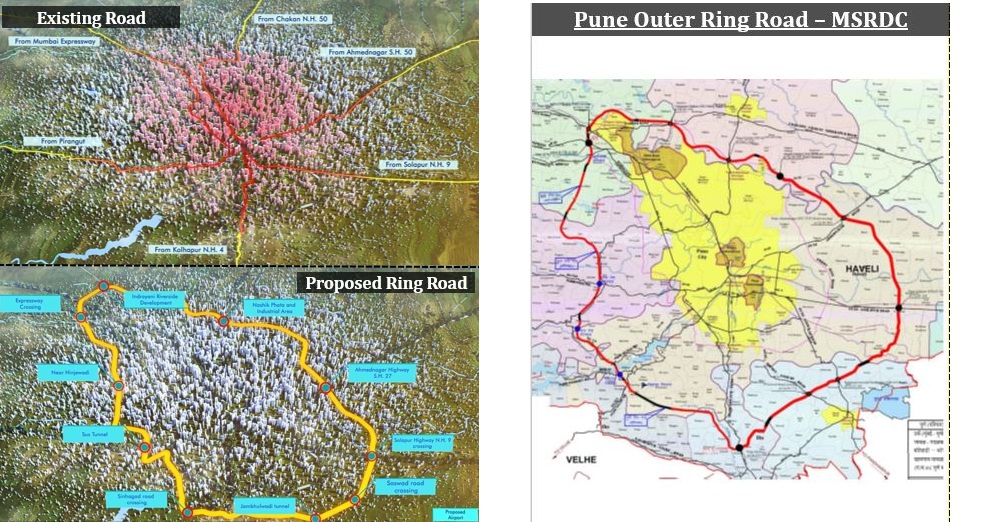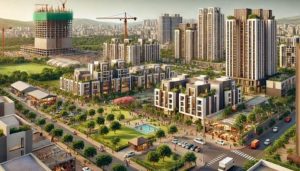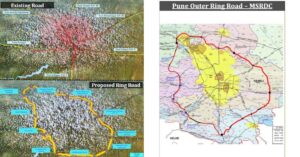The Long-Awaited Pune Ring Road Will Transform Real Estate Dynamics and Drive Growth

By Saurabh Phull
Pune, 26th October 2024: Pune is certainly upping it’s infra game resulting in its liveability quotient, if numbers are to be believed. In the first eight months of 2024, Pune’s residential sector witnessed a robust surge in property registrations, with 127,108 properties recorded—a notable 40% rise compared to the same period in 2023. Stamp duty collections also reflected this upswing, exceeding ₹4,736 crores and demonstrating an impressive 47% year-on-year growth, according to Maharashtra IGR data, as reported by Knight Frank India.
These figures highlight Pune’s growing stature as a preferred real estate destination, driven by both its infrastructural advancements and a steady influx of professionals and investors.
Pune, known for its rich cultural heritage, world-class educational institutions, and thriving IT industry, has emerged as one of India’s fastest-growing cities. In recent years, the city’s infrastructure has seen substantial upgrades, aimed at enhancing connectivity, housing, healthcare, and other critical aspects of urban life. However, this rapid urbanisation has also introduced several challenges, including traffic congestion, air pollution, and water scarcity, alongside the pressing need for expanded infrastructure. Addressing these issues through strategic development could significantly enhance the quality of life for Pune’s residents and further boost the city’s real estate appeal.
Among the key infrastructural projects reshaping Pune is the much-anticipated Pune Ring Road. This 128-kilometer expressway encircling the city is designed to alleviate traffic congestion by offering alternative routes. By linking to key highways and connecting 29 nearby villages, the Ring Road is expected to streamline movement and reduce the pressure on Pune’s city center. It will feature a reserved corridor for future metro expansion and is designed to support a vehicle speed of up to 120 km per hour. Initially announced in 2016 with the aim of easing the traffic burden, the project encountered delays due to complex land acquisition issues and escalating costs. However, recent developments have revived momentum, with the Maharashtra cabinet approving an additional ₹20,375.21 crore, pushing the total project cost to ₹42,711.03 crore.
To further expedite the project, the Pune Metropolitan Region Development Authority (PMRDA) has earmarked funds in its 2024-25 Budget to focus on land acquisition and tender processes for the first two phases of the inner ring road. The project will unfold in four phases: the first phase will connect Solu Interchange to Vadgaon Shinde, the second will link Pune-Ahmednagar Road to Solapur Road, the third will connect Pune-Solapur Road to Pune-Satara Road, and the fourth phase will complete the circuit by linking Pune-Satara Road to Parandwadi Interchange.
The Pune Ring Road is set to provide numerous benefits. By improving connectivity between major industrial areas, it is expected to stimulate economic growth and enhance logistical efficiency. This, in turn, could attract further investments, spurring job creation and boosting demand in the Pune real estate market. Additionally, by diverting heavy traffic away from residential zones, the project will reduce congestion, lower accident rates, and improve overall safety. Enhanced accessibility will also make it easier for tourists to explore the region, which is likely to lead to increased tourism and greater revenue generation—factors that will contribute positively to the city’s real estate development.
Complementing the Ring Road project are other initiatives under Pune’s Smart City mission, such as the deployment of smart street lighting, e-buses, and the development of a Digital Experience Center. The expansion of Pune’s airport and metro network further strengthens the city’s position as a rapidly evolving metropolis, creating a ripple effect that benefits the real estate sector.
In the month of September the property registrations in Pune fell by 33% to 11,056 units as per a recent report by Knight Frank India due to the Shraddh period where people typically avoid major purchases or high-value transactions. With upcoming festival season and these proposed infrastructure projects, Pune is set to overcome many of its urban challenges, while continuing to attract investors and homebuyers potentially giving a boost to its real estate sector. The city’s progress represents an exciting opportunity for growth as Pune transforms into a modern, sustainable urban hub.
(The article is authored by Saurabh Phull, COO, The Guardians Real Estate Advisory)






